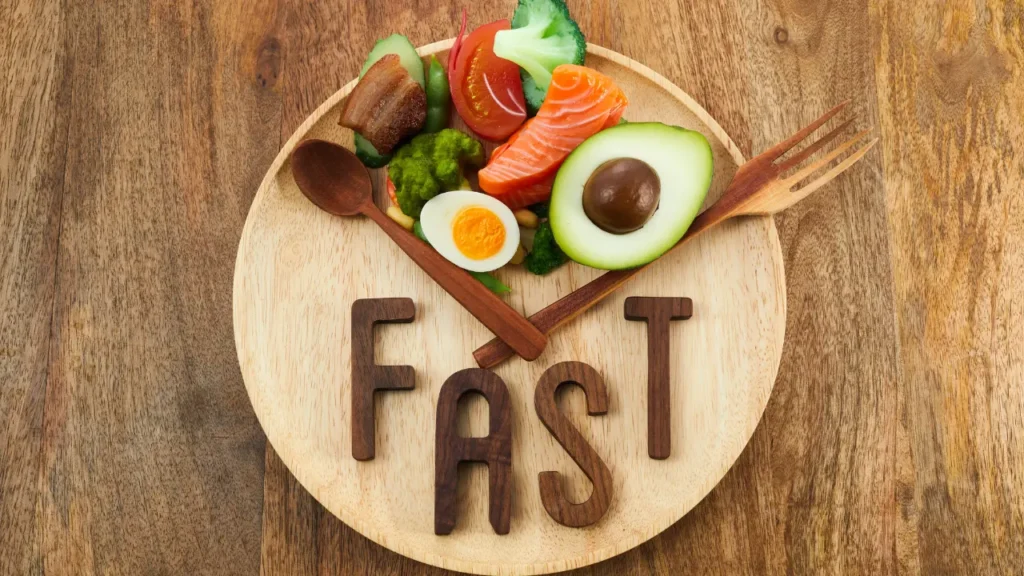Are you looking for the best diet meal plan for weight loss? Discover practical strategies, top diet plans, benefits, and common mistakes to avoid. Find your ideal weight loss plan now!

A well-crafted diet meal plan is critical to achieving successful weight loss. It’s about shedding pounds and nurturing your body with the proper nutrients. Let’s delve into the best diet meal plan for weight loss and why it matters.
Types of best diet meal plan for weight loss
1. Low-Carb Diets

Low-carb diets have gained popularity as effective strategies for weight loss. These diets revolve around reducing the intake of carbohydrates while emphasizing proteins and healthy fats. By limiting carbs, the body shifts its energy source from glucose to stored fat, promoting weight loss.
Key Features:
- Reduced Carbohydrate Intake: Low-carb diets typically limit the consumption of bread, pasta, sugars, and starchy foods.
- Focus on Proteins and Healthy Fats: Dieters often include lean meats, fish, nuts, seeds, and healthy oils like olive or coconut.
- Controlled Insulin Levels: By lowering carb intake, these diets can help stabilize blood sugar levels and insulin production.
Effectiveness and Considerations:
While effective for weight loss, low-carb diets might only suit some. Some people may experience initial rapid weight loss due to reduced water retention, but long-term success hinges on sustainable dietary changes. Moreover, it’s crucial to differentiate between healthy and unhealthy sources of fats and proteins.
Expert Tip:
Consulting a healthcare professional or a registered dietitian is advisable before embarking on a low-carb diet, especially for individuals with specific health concerns or conditions.
2. Mediterranean Diet

The Mediterranean diet is more than just a meal plan; it’s a lifestyle celebrated for its health benefits and tasteful approach to eating. Rooted in the culinary traditions of countries like Greece, Italy, and Spain, this diet is characterized by abundant fresh fruits, vegetables, whole grains, legumes, nuts, and olive oil.
Key Components:
- Plant-Based Emphasis: The diet emphasizes plant-based foods, including vegetables, fruits, whole grains, and legumes, as the primary source of nutrition.
- Healthy Fats: Olive oil, a staple in this diet, is rich in monounsaturated fats, which are beneficial for heart health.
- Moderate Consumption of Dairy and Wine: An average intake of dairy products like cheese, yoghurt, and occasional red wine is typical in this diet.
Benefits and Research:
Research indicates that adhering to the Mediterranean diet may reduce risks of heart disease, stroke, and cognitive decline. Its emphasis on nutrient-rich foods and healthy fats contributes to overall well-being and weight management.
Expert Tip:
While adopting the Mediterranean diet, focus on consuming seasonal, fresh, and minimally processed foods to reap full health benefits.
3. Vegan or Plant-Based Diets

Vegan or plant-based diets have gained substantial attention for their health benefits and ethical considerations. These diets exclude all animal products and focus on consuming plant-based foods, including fruits, vegetables, legumes, nuts, seeds, and whole grains.
Key Features:
- Plant-Focused Nutrition: The primary emphasis is nutrient-dense plant foods rich in vitamins, minerals, and antioxidants.
- No Animal Products: Vegan diets exclude meat, dairy, eggs, and other animal-derived products.
- Health Benefits: Studies suggest that adopting a well-balanced vegan diet may lead to lower risks of heart disease, diabetes, and certain cancers.
Considerations and Challenges:
While vegan diets offer numerous health benefits, they may require careful planning to ensure adequate intake of essential nutrients such as vitamin B12, iron, calcium, and omega-3 fatty acids typically found in animal products. Supplements or fortified foods can address these nutritional needs.
Expert Tip:
For those transitioning to a vegan diet, seeking guidance from a nutritionist or dietitian is beneficial to ensure a balanced intake of all essential nutrients.
4. Intermittent Fasting

Intermittent fasting (IF) isn’t just a diet but rather an eating pattern that cycles between periods of eating and fasting. This approach doesn’t dictate what foods to eat but instead focuses on when to eat them.
Key Methods:
- Different Fasting Windows: Common IF methods include the 16/8 method (16 hours of fasting, 8 hours of eating), the 5:2 method (eating normally for five days and restricting calories on two non-consecutive days), and alternate-day fasting.
- Metabolic Changes: During fasting periods, the body undergoes metabolic changes, such as decreased insulin levels and increased production of human growth hormone, promoting fat burning and cellular repair.
Benefits and Considerations:
Studies suggest intermittent fasting can aid in weight loss, improve metabolic health, and potentially enhance brain health. However, it might only suit some, especially individuals with certain medical conditions or those requiring consistent energy levels throughout the day.
Expert Tip:
Maintaining hydration and focusing on nutrient-dense foods during eating periods is essential when practising intermittent fasting. Consulting a healthcare professional before starting this eating pattern is advisable, especially for those with existing health conditions.
5. Ketogenic Diet

The ketogenic diet, often referred to as the keto diet, is a high-fat, low-carbohydrate eating plan designed to induce a state of ketosis in the body. This metabolic state involves the body relying primarily on ketones derived from fats for energy rather than glucose from carbohydrates.
Key Components:
- High Fat Intake: The diet focuses on consuming healthy fats like avocados, nuts, seeds, and oils while limiting carbohydrates, often to less than 50 grams daily.
- Moderate Protein Intake: Moderate consumption of protein sources like meat, fish, and dairy products is recommended.
- Very Low Carb Intake: Minimizing carbohydrate intake forces the body to burn fat for fuel, producing ketones.
How It Works:
By drastically reducing carb intake, the body enters a state of ketosis, where it becomes highly efficient at burning fat for energy. This metabolic shift can lead to rapid weight loss and improved insulin sensitivity.
Considerations and Expert Tips:
The ketogenic diet might not be suitable for everyone, and some individuals might experience the “keto flu” during the initial adaptation phase. They maintain adequate hydration and electrolyte balance, and focusing on consuming healthy fats while on this diet is crucial.
Expert Tip:
Before starting a ketogenic diet, consulting with a healthcare professional or a registered dietitian is essential, especially for those with underlying health conditions or seeking long-term sustainability.
Benefits of the best diet meal plan for weight loss?

A well-designed diet plan tailored to individual needs facilitates steady and sustainable weight loss. It isn’t just about shedding excess pounds but also about fostering a healthier relationship with food and enhancing overall well-being.
Improved Health:
Opting for a balanced diet not only aids in weight management but also contributes to overall health improvement. It supplies essential nutrients, vitamins, and minerals, lowering the risk of chronic diseases like diabetes, cardiovascular issues, and certain cancers.
Increased Energy Levels:
A balanced and nutritious diet provides the necessary energy to fuel daily activities and workouts. This not only aids in weight loss efforts but also promotes better physical performance and mental alertness.
Better Mood and Well-being:
Eating a well-balanced diet rich in nutrients can positively impact mental health. It promotes better mood stability, reduces stress, and fosters a sense of overall well-being.
Enhanced Longevity:
A consistent healthy diet can contribute to a longer and healthier life. It aids in maintaining proper bodily functions, cellular repair, and mitigating the risks of age-related ailments.
Improved Body Composition:
Besides weight loss, a suitable diet plan can help reshape the body by reducing fat and preserving lean muscle mass. This leads to a better body composition and physical appearance.
Choosing the best diet meal plan for weight loss?

The right diet plan tailored to individual preferences and health goals is crucial for weight loss. Here’s a breakdown of factors to consider when choosing a plan:
Personal Goals:
Identify your specific weight loss goals and aspirations. Whether it’s losing a certain amount of weight, improving overall health, or enhancing energy levels, aligning your diet with these goals is essential.
Dietary Restrictions:
Consider any dietary restrictions or intolerances you may have. Some diets might not suit certain medical conditions or allergies. Tailoring a plan to accommodate these restrictions ensures both adherence and well-being.
Lifestyle Considerations:
Take into account your lifestyle and daily routine. Choose a diet plan that fits seamlessly into your lifestyle, ensuring its practicality and sustainability. For instance, someone with a hectic schedule might benefit from a meal-prepping-friendly diet.
Preferences and Enjoyment:
Opt for a diet plan that includes foods you enjoy and can sustain in the long run. This increases the likelihood of adherence and prevents feelings of deprivation.
Consultation:
Seeking advice from a nutritionist or a healthcare professional can provide personalized guidance and recommendations based on your unique needs and circumstances.
Trial and Adjustment:
Be open to trial periods and adjustments. Sometimes, it takes experimentation to find the best diet plan for you. Feel free to modify or switch plans if needed for better results.
Best Practices For Weight Loss

When embarking on a weight loss journey through a diet plan, incorporating these best practices can significantly enhance success:
Meal Prepping:
Planning and preparing meals in advance can be a game-changer. It helps control portion sizes, ensures you have healthy options readily available, and reduces the likelihood of impulsive, unhealthy choices.
Portion Control:
Being mindful of portion sizes is crucial. Even with healthy foods, excessive portions can lead to excess calorie intake, hindering weight loss, and using smaller plates or measuring portions aids in managing intake.
Regular Exercise:
Pairing a healthy diet with regular exercise amplifies weight loss efforts. Engaging in physical activities you enjoy, whether jogging, cycling, dancing, or any other form of exercise, contributes to burning calories and improving overall fitness.
Balanced Nutritional Intake:
Focus on a well-balanced diet that includes a variety of nutrient-rich foods. Ensure adequate intake of proteins, healthy fats, vitamins, and minerals to support overall health and weight loss goals.
Mindful Eating:
Practice mindful eating by being aware of hunger cues, eating slowly, and savoring each bite. This helps digestion, prevents overeating, and fosters a healthier relationship with food.
Consistency and Patience:
Consistency is critical when following a diet plan. Sustainable weight loss takes time, so it’s essential to remain patient and persistent, celebrating small victories.
Common Mistakes in Diet Meal plan for Weight Loss

Avoiding these common pitfalls can significantly improve the success rate of a weight loss journey through a diet plan:
Over-Restricting:
Extreme calorie restriction or eliminating entire food groups might seem adequate initially, but it can lead to nutrient deficiencies. Strive for balance rather than drastic limitations.
Ignoring Nutritional Balance:
Focusing solely on weight loss goals without considering the nutritional content of foods can be detrimental. Ensure your diet comprises a variety of nutrients to support overall health.
Relying on Fad Diets:
Fad diets promising quick fixes often lack sustainability and can lead to yo-yo dieting. Opt for long-term, sustainable dietary changes rather than short-term drastic measures.
Skipping Meals:
Skipping meals, especially breakfast, can slow down metabolism and lead to overeating later in the day. Aim for regular, balanced meals and snacks to maintain steady energy levels.
Emotional Eating:
Using food as a coping mechanism for emotions or stress can hinder weight loss progress. Seek alternative ways to manage emotions without turning to food.
Lack of Physical Activity:
Relying solely on diet changes without incorporating exercise might limit weight loss results. Physical activity aids in burning calories and improves overall health.
FAQs
What’s the most effective diet?
The most effective diet varies for individuals based on preferences and body responses.
Can I lose weight fast with a diet?
Rapid weight loss diets may yield quick results but often need more sustainability and can lead to health issues.
Are all diets suitable for everyone?
No, different bodies respond differently to diets. Consult a nutritionist for personalized advice.
How do I maintain weight loss?
Sustain weight loss by sticking to healthy habits, regular exercise, and mindful eating.
What if I have dietary restrictions?
Consult a nutritionist to tailor a diet that meets your dietary needs and restrictions.
How long before seeing results?
Results vary, but with consistency, healthy changes can yield noticeable results within weeks.
Conclusion
In summary, the best diet meal plan for weight loss aligns with personal preferences, health needs, and lifestyle choices. Choose wisely, be consistent, and prioritize health over quick fixes.









